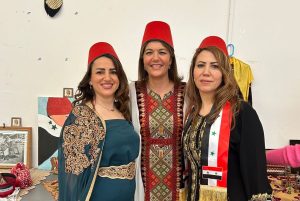Syrian cultural group reaching out to the broader community
Melbourne’s Syrian community recently showcased its culture and traditions at an event in Melbourne’s northern suburbs.
The Zenobia Association welcomed more than a hundred people to its Syrian Lammeh (‘Syrian Gathering’) celebration.
The event aimed to introduce Syrian culture and traditions to the broader community in Melbourne’s north.
The event featured traditional costumes reflecting the beauty and authenticity of Syrian culture as well as musical performances on the Buzuq and Aud. Traditional Syrian food, prepared by Zenobia members, was served.
There was also a Dabkkeh dance performed by the Zenobia Association’s Syrian Youth Group. Face painting and henna artistry was provided for kids and families.
 Association founder Norma Medawar told the gathering of the importance of diaspora communities maintaining connections with their traditions and history.
Association founder Norma Medawar told the gathering of the importance of diaspora communities maintaining connections with their traditions and history.
“The music and artistic traditions of Syria help to define us and help to preserve our values of supporting each other contributing to our communities,” Norma said.
Present at the event were local state politicians Iwan Walters MP, Nathan Lambert MP and Bronwyn Halfpenny MP as well as City Mayor Kurt Naim.
The event, held at the Merrilands Community Centre, also saw the traditional art, costumes and handcrafts of Syria on display.
Zenobia is a support group based in Melbourne’s north the helps newly arrived migrant and refugee women navigate their new lives in Australia.
The not-for-profit organisation’s programs provide advice and information on a range of important aspects of life in Australia including vaccinations, mental health, Centrelink services, aged care, and the health and education systems.
And the women are also volunteering to help vulnerable people in the broader community.
‘Zenobia’, named after third-century Syrian queen, has also been providing citizenship classes for the women members.
Norma said the group’s philosophy was to be inclusive and to empower women to take full places in society and achieve their social and economic goals.
She said it was with this in mind that she came up with the name Zenobia, who was a cultured monarch who fostered an intellectual environment in her court, which was open to scholars and philosophers.
She was tolerant toward her subjects and protected religious minorities.
The queen maintained a stable administration which governed a multicultural and multiethnic empire.
Zenobia died after 274 AD, and many tales have been recorded about her fate. Her rise and fall have inspired historians, artists and novelists, and she is a patriotic symbol in Syria.












